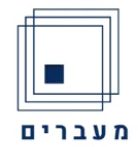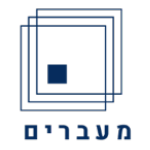Maavarim, Meaning "Transitions״, is a program that accompanies research-oriented students – from undergraduate to postdoctoral – in their personal and professional development processes.
The program came as an answer to a lack of vision and long-term systemic thinking about the training of research students.
We accept the existing situation as the best, or at least as good as possible, without thinking ahead and asking what is the best way to promote the training and development of research students?
The development and promotion of research students is a worldwide challenge, at all nations and Israel among them. This challenge requires intellectual and practical effort, and today too little effort is devoted to the needed progress.
Maavarim plan consists of modules of action:
The Planning and development of researchers' career; Research grants (Marie Curie, ERC and in general); Postdoctoral fellowship; Mentor-Mentee relationship; Good virtues, bad virtues in the academia; Employment and life beyond the academia; Academic leadership; Publication and research skills; Maavarim in crisis; and Research tools. You can view previous sessions by modules, or under the board of the relevant semester.
Meetings that accrued in English:
The Lean, The Mean, and The Keen: How to Read and Respond to Reviewer Reports
Dr. Renana Peres Monday 12th of October, 2020, 14:30-16:00. You can watch the video here
You submitted your paper to the journal, waited for 2-3 months, or more, and now it is back with the reviewer reports. They rarely say that your paper was amazing. Often they have many suggestions and corrections, sometimes they contradict each other. What do you do? In this talk, we will introduce you to the science (some say, art) of reading and responding to referee reports. We start with reading – what is important and what is not? How to read between the lines? Why is Reviewer 3 always so mean? We then move to building a revision plan. Finally we give some tips and advice as to the writing of the point-by-point reply. We will analyse some ereal life examples, and show how things look from the reviewers' perspective
Dr. Renana Peres is an associate professor of marketing at the Jerusalem School of Business Administration at the Hebrew University of Jerusalem. She earned her BSc. And MSc in Physics, and is currently dealing with applying mathematical models in social sciences. Her research deals with social interactions, understanding how word of mouth is generated on brands, how this word of mouth is translated into sales. She is an Area Editor of the International Journal of Research in Marketing, and a member of the Editorial Review Board of the Journal of Marketing Research, Journal of Marketing, and Scientific Reports. Dr. Peres is the Founding CEO of Persay Ltd, an Israeli high-tech firm focusing on development and implementation of algorithms for voice –based recognition.
The Art of Writing: From Research Data and What’s in Your Head to an Influential Publication
פרופ' יואל מגדל, יום חמישי ה-22 באוקטובר, 2020, משעה 14:00 עד 15:30. ההרצאה באנגלית. זו חזרה על הרצאה שנתנה במאי 2020. ההרצאה הוקלטה וזמינה לצפייה.
Joel S. Migdal is a visiting professor at the Hebrew University of Jerusalem. He is also the Robert F. Philip Professor of International Studies in the University of Washington’s Henry M. Jackson School of International Studies. Dr. Migdal was formerly associate professor of Government at Harvard University and senior lecturer at Tel-Aviv University. Dr. Migdal is the founding chair of the University of Washington‘s International Studies Program. In 1993, he received the University of Washington’s Distinguished Teaching Award; in 1994, the Washington State Governor’s Writers Award; in 2006, the Marsha L. Landolt Distinguished Graduate Mentor Award; and, in 2008, the Provost Distinguished Lectureship.
How to increase your creativity in scientific writing, while preventing writer’s block
. A talk with Prof. Amos Bouskila, Dept. of Life Sciences, Ben-Gurion Univ. of the Negev. Thursday 19th of november, 2020, 14:00-15:30. The duration of the presentation will be One . hour and a quarter, including time for questions at the end. The video is available here
We will learn stages in a simple technique that enables us to write a thesis, a proposal or an article with continuity and enthusiasm. The use of the suggested stages will allow you to express your creativity, even if you were sure that creativity is not one of your strengths. With this technique you will be able to prevent one of the most frustrating feelings in the life of a scientist – writer’s block. The presentation is based on a workshop in which I participated as a graduate student in California. It revolutionized my writing of the thesis, and since then, many generations of my students have benefited from it. My former students tell me the technique keeps helping them loyally, ever since they were exposed to it, during all types of writing tasks they encounter in their professional life
Amos Bouskila studied his first and second degree at the Hebrew Univ. of Jerusalem. During the work on his MSc he established and was the first director of the Israel Reptile Information Center that was supported by the Society for the Protection of Nature in Israel. In 1988 he started his PhD in Ecology at the Univ. of California, Davis and went on to do a post-doc in Vancouver. He studied the use of Game Theory to understand the relationships between predators and prey in natural systems and went on in this direction when he accepted the position at Ben-Gurion Univ. of the Negev in 1994. He studies now behavioral ecology, reptiles and their conservation and social networks in Equids who live in the wild.
The Art of Writing: From Research Data and What’s in Your Head to an Influential Publication
מפגש עם פרופ' יואל מגדל, יום שלישי ה-12 במאי, 2020, משעה 14.30 עד 16.00. ההרצאה באנגלית. הקלטת שמע של המפגש זמינה כאן.
Joel S. Migdal is a visiting professor at the Hebrew University of Jerusalem. He is also the Robert F. Philip Professor of International Studies in the University of Washington’s Henry M. Jackson School of International Studies. Dr. Migdal was formerly associate professor of Government at Harvard University and senior lecturer at Tel-Aviv University. Dr. Migdal is the founding chair of the University of Washington‘s International Studies Program. In 1993, he received the University of Washington’s Distinguished Teaching Award; in 1994, the Washington State Governor’s Writers Award; in 2006, the Marsha L. Landolt Distinguished Graduate Mentor Award; and, in 2008, the Provost Distinguished Lectureship.

